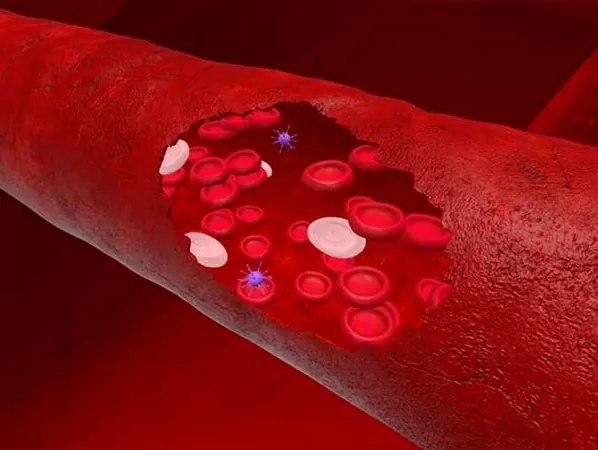
COVID-19 Could Age Your Blood Vessels by 5 Years—Particularly for Women!
2025-08-18
Author: Michael
A Shocking Discovery About COVID-19 and Vascular Health
A recent study has unveiled a startling finding: COVID-19 infections could cause blood vessels to age by about five years, with the effect being especially pronounced in women. This revelation comes from research involving around 2,400 participants across 16 countries, including Australia, Brazil, and several European nations.
Long COVID: A Growing Concern
The research identified that women dealing with lingering symptoms after their COVID-19 recovery—collectively referred to as 'long COVID'—experienced a greater increase in vascular age. Symptoms such as fatigue and shortness of breath seem to exacerbate the aging process of blood vessels.
Rosa Maria Bruno, the lead researcher from Université Paris Cité in France, emphasized the ongoing mystery surrounding the long-term effects of COVID-19 and the body’s response to it: "While many are left grappling with prolonged symptoms, we are still piecing together what those symptoms reveal about the body’s health post-infection."
How Was the Study Conducted?
Published in the European Heart Journal, the study measured participants' vascular age using a method called 'carotid-femoral pulse wave velocity.' This technique assesses how quickly blood pressure waves travel from the neck to the legs. An increase in this velocity reflects stiffer and aging blood vessels.
Alarming Results!
Six months post-infection, the study showed dramatic changes: blood vessel stiffness increased by an average of 0.55 meters per second in women who had mild infections, rose to 0.60 meters per second for those hospitalized, and surged over one meter per second for women in intensive care. This translates into a significant risk of cardiovascular diseases like heart attacks and strokes.
Why Are Women More Affected?
The findings highlighted that while women exhibited significant changes in vascular health, men did not show the same patterns. Bruno noted that the unique immune responses of women could protect them during an infection but may also lead to greater vascular damage afterwards.
The Aftermath of COVID-19: A New Health Crisis?
In a related editorial, researchers from Harvard Medical School reflected on the urgent need to address the complications arising from COVID-19: "As the acute threat of the pandemic recedes, a new challenge looms—the long-term effects of post-acute COVID-19 syndrome." They stressed that the vascular legacy left by COVID-19 is a measurable reality, particularly for women.
Looking Ahead: Can We Protect Our Vascular Health?
With evidence mounting that COVID-19 may accelerate vascular aging, the pressing question remains: can we find actionable solutions to mitigate this risk in future outbreaks? The focus is now on identifying strategies to safeguard vascular health, especially for those affected by COVID-19.
This study serves as a crucial wake-up call not just for medical professionals, but for anyone who has battled COVID-19, reminding us that the impacts of the virus may linger long after the acute infection has passed.









 Brasil (PT)
Brasil (PT)
 Canada (EN)
Canada (EN)
 Chile (ES)
Chile (ES)
 Česko (CS)
Česko (CS)
 대한민국 (KO)
대한민국 (KO)
 España (ES)
España (ES)
 France (FR)
France (FR)
 Hong Kong (EN)
Hong Kong (EN)
 Italia (IT)
Italia (IT)
 日本 (JA)
日本 (JA)
 Magyarország (HU)
Magyarország (HU)
 Norge (NO)
Norge (NO)
 Polska (PL)
Polska (PL)
 Schweiz (DE)
Schweiz (DE)
 Singapore (EN)
Singapore (EN)
 Sverige (SV)
Sverige (SV)
 Suomi (FI)
Suomi (FI)
 Türkiye (TR)
Türkiye (TR)
 الإمارات العربية المتحدة (AR)
الإمارات العربية المتحدة (AR)